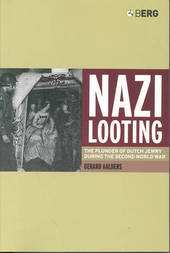
|
Nazi Looting: The Plunder of Dutch Jewry during the Second World War
Paperback / softback
Main Details
| Title |
Nazi Looting: The Plunder of Dutch Jewry during the Second World War
|
| Authors and Contributors |
Translated by Arnold Pomerans
|
|
Translated by Erica Pomerans
|
|
By (author) Gerard Aalders
|
| Physical Properties |
| Format:Paperback / softback | | Pages:288 | | Dimensions(mm): Height 216,Width 138 |
|
| Category/Genre | Second world war |
|---|
| ISBN/Barcode |
9781859737279
|
| Classifications | Dewey:940.53109492 |
|---|
| Audience | | General | | Professional & Vocational | |
|---|
| Illustrations |
bibliography, index
|
|
Publishing Details |
| Publisher |
Bloomsbury Publishing PLC
|
| Imprint |
Berg Publishers
|
| Publication Date |
1 January 2004 |
| Publication Country |
United Kingdom
|
Description
Translated by Arnold Pomerans with Erica Pomerans The Nazi looting machine was notoriously efficient during the Second World War. In the Netherlands, 8.5 million citizens suffered losses estimated at 3.6 billion guilders. Approximately one-third of these losses were borne by Jews, who comprised only 1.6 per cent of the total population. In today's terms, the German occupiers stripped the Jewish population of assets worth USD7 billion. Nazi Looting offers a comprehensive history of the Dutch experience and demonstrates how reputable indigenous institutions acted as willing collaborators. Beginning with a survey of international law and various definitions of 'looting', the author shows how the Germans systematically robbed Dutch Jewry through a variety of means that gave the outward appearance of 'honest' trading. Forced to sell under duress and at unreasonably low prices, few dared refuse the German on the doorstep when threatened with prison or incarceration in a camp. The plundering was total and systematic. In May 1940, a team of highly trained art historians, linguists, musicologists and literary experts arrived immediately behind the victorious German troops to catalogue the vast collections for Hitler. From 1941, Jews were compelled to deposit all their money into a bank called 'Lippmann, Rosenthal Co.' The name of the bank itself was a cynical ploy since it was taken from a respected, Jewish-owned Amsterdam bank and presented as a new branch. This bank, however, simply channelled money into the Third Reich with the help of the Amsterdam Stock Exchange, insurance brokers and other well-established Dutch banks. Once the Jews were deported, their houses were emptied and the contents used to re-furnish bombed out areas of the Reich. In common with many other formerly Nazi-occupied countries in Europe, the Netherlands has been unable to retrieve many of its pre-war assets. More than fifty years after the war's end, 20 per cent of its most important pre-war museum exhibits and approximately 80 per cent of the less important works remain untraced. Painstakingly researched, Nazi Looting exposes a chillingly calculating and brutally destructive process that reverberates to this day.
Author Biography
Gerard Aalders Senior Researcher,Netherlands Institute for War Documentation Translated from the Dutch by Arnold Pomerans with Erica Pomerans
Reviews'Nazi Looting does endure as a testament to the far reaching, systematic exploitation and robbery of the Dutch Jews, whose savings and propety were plundered by German officials and Dutch fellow citizens alike...It has also proved invaluable for countless Dutch Survivors seeking to investigate the plight of their families' property during "the greatest looting in Dutch history"... Aalder's work has served as a vital reference tool for commissions charged with investigating the extent of the wartime looting and the effectiveness of the post-war recovery process. It has also proved invaluable for countless Dutch survivors seeking to investigate the plight of their families' property' H-Net Book Review by Jennifer L. Foray, Department of History, Columbia University 'Nazi Looting provides the first in-depth and accessible study of the multiplicity of ways in which the Nazis stole Jewish property in the wartime Netherlands. Gerard Aalders' meticulous and exhaustive research brings out all the political and economic facets of this contentious and topical subject. Essential reading for a true understanding of Nazi policies in occupied Western Europe.'Bob Moore, University of Sheffield A comprehensive account of the pillage of Jewish properties during the occupation of the Netherlands. Holocaust and Genocide StudiesThe book's value lies primarily in Aalders' attempt to write the missing standard work on the pilfering of Jewish property. NRC HandelsbladAalders' great achievement is his detailed reconstruction and, wherever possible, quantification of all those discreet and less-discreet regulations and actions aimed at separating Jews from their property. Vrij Nederland
|